 Emergency care | Inequalities | Primary, community and social care services
Emergency care | Inequalities | Primary, community and social care services
Learning about what works in urgent community response
The initial report from the national urgent community response (UCR) evaluation, along with an economic modelling tool to help service providers and systems understand the impact of UCR, is now available.
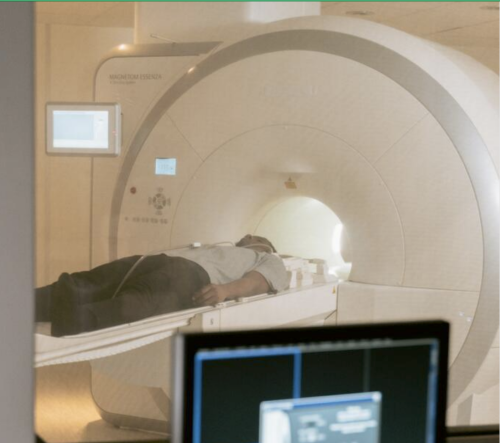 Elective care | Emergency care | Policy
Elective care | Emergency care | Policy
How is growth in diagnostic testing affecting the hospital system?
Diagnostic services, such as medical imaging, endoscopy, and pathology, have grown substantially in recent years and at a faster rate than most other healthcare services. Increased diagnostic testing brings benefits to patients, but rapid growth of this service area within a complex, adaptive…
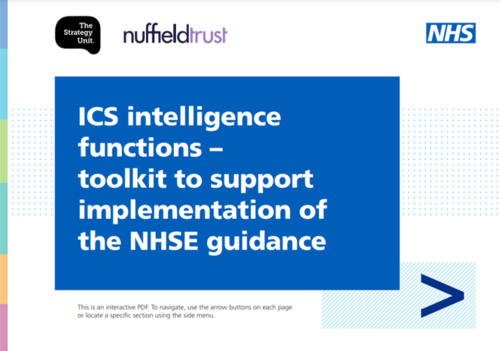 Better use of analysis | Policy | Integrated Care
Better use of analysis | Policy | Integrated Care
ICS intelligence functions – a toolkit to support the implementation of NHSE guidance
In 2020, NHSE announced the expectation that ICSs should develop “shared cross-system intelligence and analytical functions that use information to improve decision-making at every level.” This expectation has been followed by more detailed
 Evaluation and impact assessment | Futures thinking | Learning and development | Strategy development
Evaluation and impact assessment | Futures thinking | Learning and development | Strategy development
Evaluating and embedding social values in procurement at East London NHS Foundation Trust
This report presents emerging findings from the early development stages of a social value approach to procurement by East London NHS Foundation Trust (ELFT). These findings provide insights for other organisations beginning to explore how to use procurement to contribute to improving health and…
 Mental health | Policy
Mental health | Policy
Estimating the impact of the proposed reforms to the Mental Health Act on the workload of psychiatrists
In January 2021, the Government published a White Paper, setting out its plans to reform the Mental Health Act. The Government invited views on the paper and in July 2021, it published a summary of the consultation responses and its plans to address the issues raised. The proposed reforms aim to…
 Mental health | Primary, community and social care services
Mental health | Primary, community and social care services
Inequities in children and young people’s mental health services
Good mental health during early years and childhood has a great bearing on health throughout life. By contrast, poor mental health can cast a long shadow. Consequences may include depression, self-harm, and poor physical health. Services recognise this. They aim to provide access to support in a…
 Better use of analysis | Elective care | Emergency care | Inequalities | Primary, community and social care services | Public health and prevention
Better use of analysis | Elective care | Emergency care | Inequalities | Primary, community and social care services | Public health and prevention
Less noise and more light: using criteria-driven analysis to tackle inequalities
Reducing health inequality is a long-standing aim of health policy. Yet the gap between policy aim and population outcome has grown in recent years: on most measures health inequalities have got worse.
 Inequalities | Mental health | Policy | Primary, community and social care services | Public health and prevention
Inequalities | Mental health | Policy | Primary, community and social care services | Public health and prevention
Learning from lockdown: support for people experiencing homelessness
There are few clearer measures of societal health than homelessness. On this count, and despite its enormous material wealth, England is in poor shape. Relative to the recent past, and any country we might want to compare ourselves to, we have a problem with homelessness. The causes of homelessness…
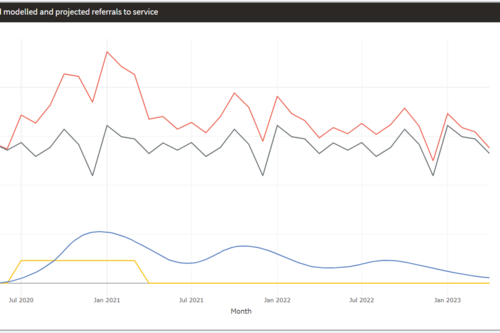 Better use of analysis | Inequalities | Mental health
Better use of analysis | Inequalities | Mental health
Mental Health Surge Model
Early in the Covid pandemic, it became clear that people’s mental health would suffer. Whether through bereavement, unemployment, social isolation, not being able to access support services – or a host of other routes – an alarming picture began to emerge and attract attention.
 Inequalities | Mental health
Inequalities | Mental health
Accessibility of perinatal mental health services for women from Ethnic Minority groups
Barriers to accessing mental health care during pregnancy and the first postnatal year (perinatal period) seem to be greater for ethnic minority women.
How can Integrated Care Systems collect and use more ‘person-centred intelligence’?
Working with our partners Ipsos MORI, we have produced detailed guidance and an offer of services to address this question. This webpage contains information about the work, and all the products from it. Please get in touch if you would like to improve your use of person-…
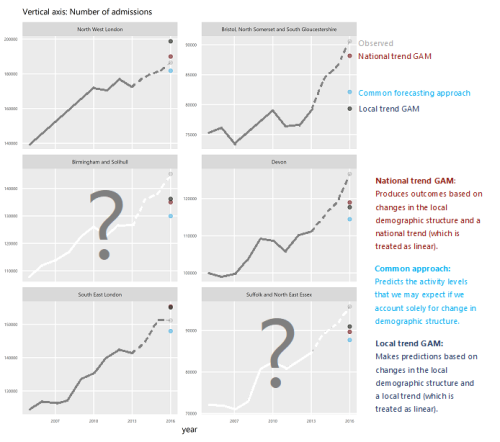 Elective care | Emergency care | Finance and payments | Policy | Primary, community and social care services
Elective care | Emergency care | Finance and payments | Policy | Primary, community and social care services
How will we know if Integrated Care Systems reduce demand for urgent care?
The implications of a blended payment system are far reaching: Decisions about planned activity levels will determine the total funding envelope for urgent care within a system and will influence the behaviour of healthcare providers and the services they deliver to patients.
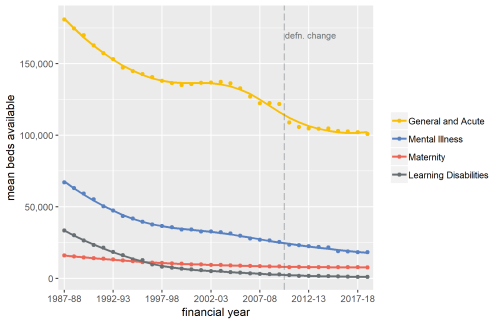 Elective care | Mental health
Elective care | Mental health
Exploring Mental Health Inpatient Capacity
This report explores the pressures on inpatient mental health services across Sustainability and Transformation Partnerships in England, drawing on a wide range of datasets, published research and interviews with staff working on mental health services. The report was commissioned by and includes…
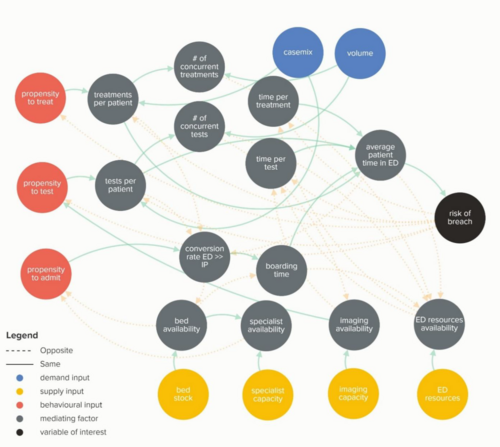 Emergency care | Policy
Emergency care | Policy
Waiting Times and Attendance Durations at English A&E Departments
In March 2019, NHS England is expected to report the outcome of its review of constitutional waiting times targets. This report reviews the factors that have led to the decline in performance against one of these targets - the 4-hour target for Accident and Emergency Departments. The analysis…
 Inequalities | Mental health
Inequalities | Mental health
Evaluation of Building the Right Support: findings to date
Building the Right Support is a national plan to provide better support to people with a learning disability or autism. It says what services and supports are needed to help people whose behaviour challenges services or who have mental health problems.
 Mental health
Mental health
Evaluation of an Integrated Mental Health Liaison Service (Rapid Assessment Interface and Discharge Service) in Northern Ireland
A high proportion of patients treated for physical health conditions also have co-morbid mental health problems; and there is growing acceptance of a need to raise awareness of mental health issues in acute hospitals and improve the experience of care and treatment for this group.
Making a priority of mental health and wellbeing in Nottinghamshire
Nottinghamshire has been an early mover in the transition from Sustainability and Transformation Partnerships (STP) to Integrated Care Systems (ICS) within the NHS in England. As part of that transition, it made a conscious commitment to prioritise the transformation of mental health and wellbeing…
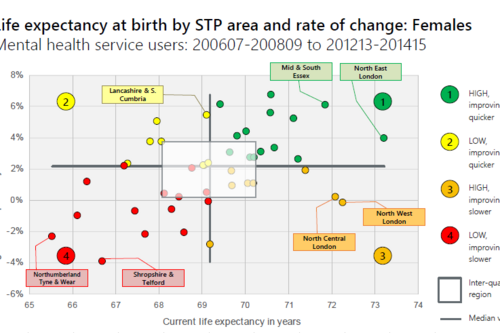 Inequalities | Mental health
Inequalities | Mental health
Making the case for integrating physical and mental health services in England - National overview
This is a national overview report of our Making the case for integrating physical and mental health services reporting which took place in July 2017. The original reports looked at the physical health of people who use mental health services; life expectancy, acute hospital use and…
Horizontal or Vertical: Which way to integrate?
In 2011, Primary Care Trusts faced a difficult choice. The Transforming Community Services policy required a complete break of commissioner and provider functions. But what should PCTs do with the community health services they delivered; vertically integrate with an acute trust, horizontally…
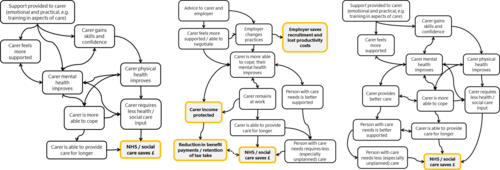 Service configuration | Service improvement | Integrated Care
Service configuration | Service improvement | Integrated Care
Scoping study: the economics of caring
There is a clear moral case for supporting unpaid carers. They play an essential role in the lives of the people they care for; they often do so at a cost to their own wellbeing. But what is the economic case for supporting carers? And to what extent does the evidence base support this case?…